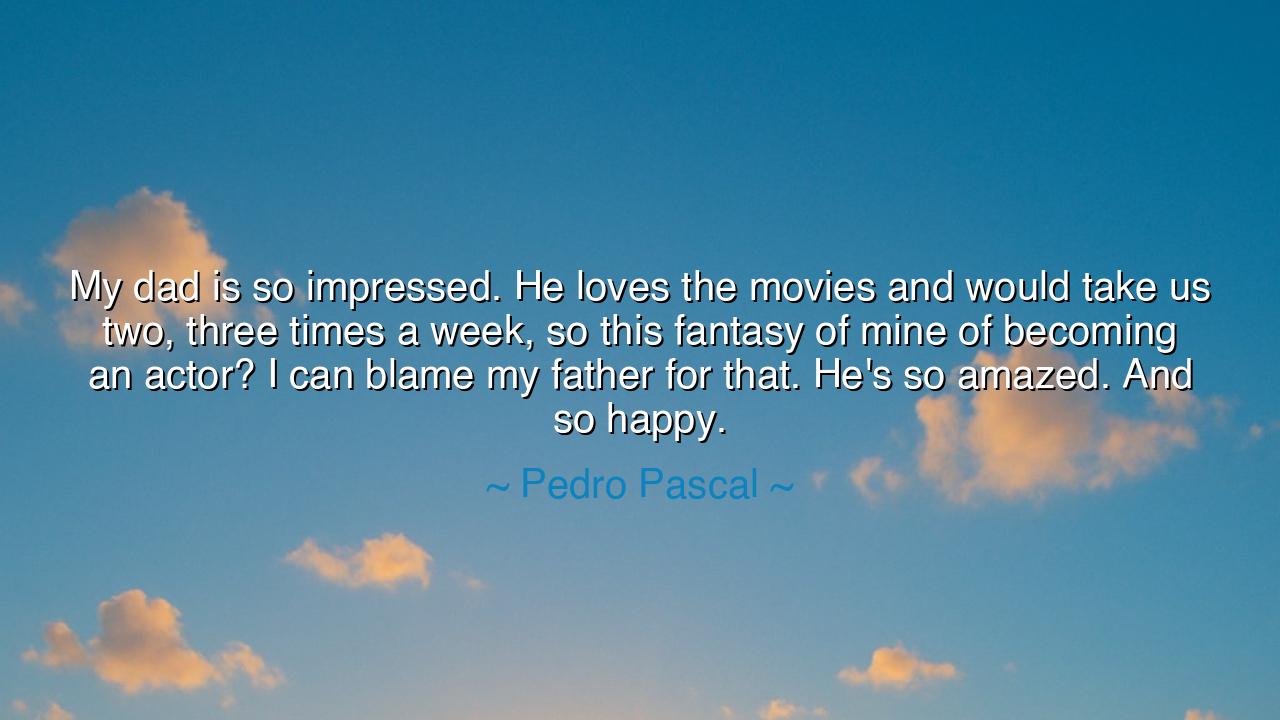
My dad is so impressed. He loves the movies and would take us
My dad is so impressed. He loves the movies and would take us two, three times a week, so this fantasy of mine of becoming an actor? I can blame my father for that. He's so amazed. And so happy.






The words of Pedro Pascal—“My dad is so impressed. He loves the movies and would take us two, three times a week, so this fantasy of mine of becoming an actor? I can blame my father for that. He's so amazed. And so happy.”—resound not merely as a tribute to a parent, but as a hymn to the inheritance of dreams. In them lies the eternal truth that what we become is often born not from our own design, but from the silent seeds sown by those who came before us. A father’s passion, shared in moments of joy and wonder, becomes the spark that lights a child’s destiny. Pascal’s words, tender and reflective, are a reminder that greatness often begins in the warmth of a shared experience—a child watching a story unfold beside the one who first taught him to dream.
At its heart, this quote speaks of legacy, not of wealth or title, but of inspiration. Pascal’s father, by taking him to the movies again and again, unknowingly became the architect of his son’s imagination. The darkened cinema, the flickering light, the collective breath of the audience—all these became a sacred temple of creation in the young boy’s mind. In those moments, something eternal passed between father and son: not instruction, but awakening. The father loved the magic of film; the son learned to create it. Such is the mysterious chain of influence—one generation’s passion becomes the next generation’s purpose.
This bond between parent and child echoes through history. Consider Wolfgang Amadeus Mozart, whose father Leopold, a skilled musician himself, nurtured his son’s gift with devotion and discipline. It was Leopold’s early tutelage, his love of music and belief in its divine order, that shaped Mozart’s genius. Like Pascal’s father, he opened a door to a world larger than himself, and his child stepped through it to carry the torch further than the parent ever could. This is the sacred rhythm of legacy: the elder dreams, the younger fulfills. The flame of passion never dies—it simply changes hands.
In Pascal’s voice there is also gratitude, deep and resonant. To “blame” his father, he says with affection, is not an accusation but a celebration. It is a way of saying that our dreams are not ours alone. We are each the result of countless unseen gestures—stories told at bedtime, songs sung in the car, the light in a parent’s eyes when they share what they love. These small acts, repeated across years, mold the heart and spirit of a child. And when that child, grown, steps into greatness, he does so not alone, but carrying the echo of that early love.
There is beauty, too, in the father’s amazement and happiness. For what parent does not wish to see their joy become their child’s calling? When Pascal’s father watches his son upon the screen, he witnesses not only art, but the reflection of his own dreams fulfilled. It is as though life, in its infinite kindness, returns to him the very magic he once gave. In that moment, the cycle of love is complete: the giver becomes the receiver; the dreamer watches his dream take form in another’s life.
The emotional power of this quote lies in its reminder that art and love are generational gifts. The world often measures success by fame or wealth, but the truest success lies in inspiring another soul to create, to feel, to live deeply. Every parent, every teacher, every friend who shares their passion plants a seed that may blossom long after they are gone. As Pascal’s story shows, one act of simple love—going to the movies together—can ripple outward into the world as something magnificent.
Let this then be the teaching to those who come after: never underestimate the power of shared wonder. The stories you love, the dreams you speak, the joy you express before those who look up to you—these are the fires that forge future greatness. And if you are the child of such love, do not forget your origins. Remember the hands that guided you toward your light, the hearts that believed before the world did. For every dream fulfilled is a testament not only to the dreamer, but to those who first dared to imagine it. Thus, when you rise in your craft, your calling, or your courage, let gratitude be your crown—and say, as Pedro Pascal did, “I can blame my father for that. He is amazed. He is happy.”






AAdministratorAdministrator
Welcome, honored guests. Please leave a comment, we will respond soon